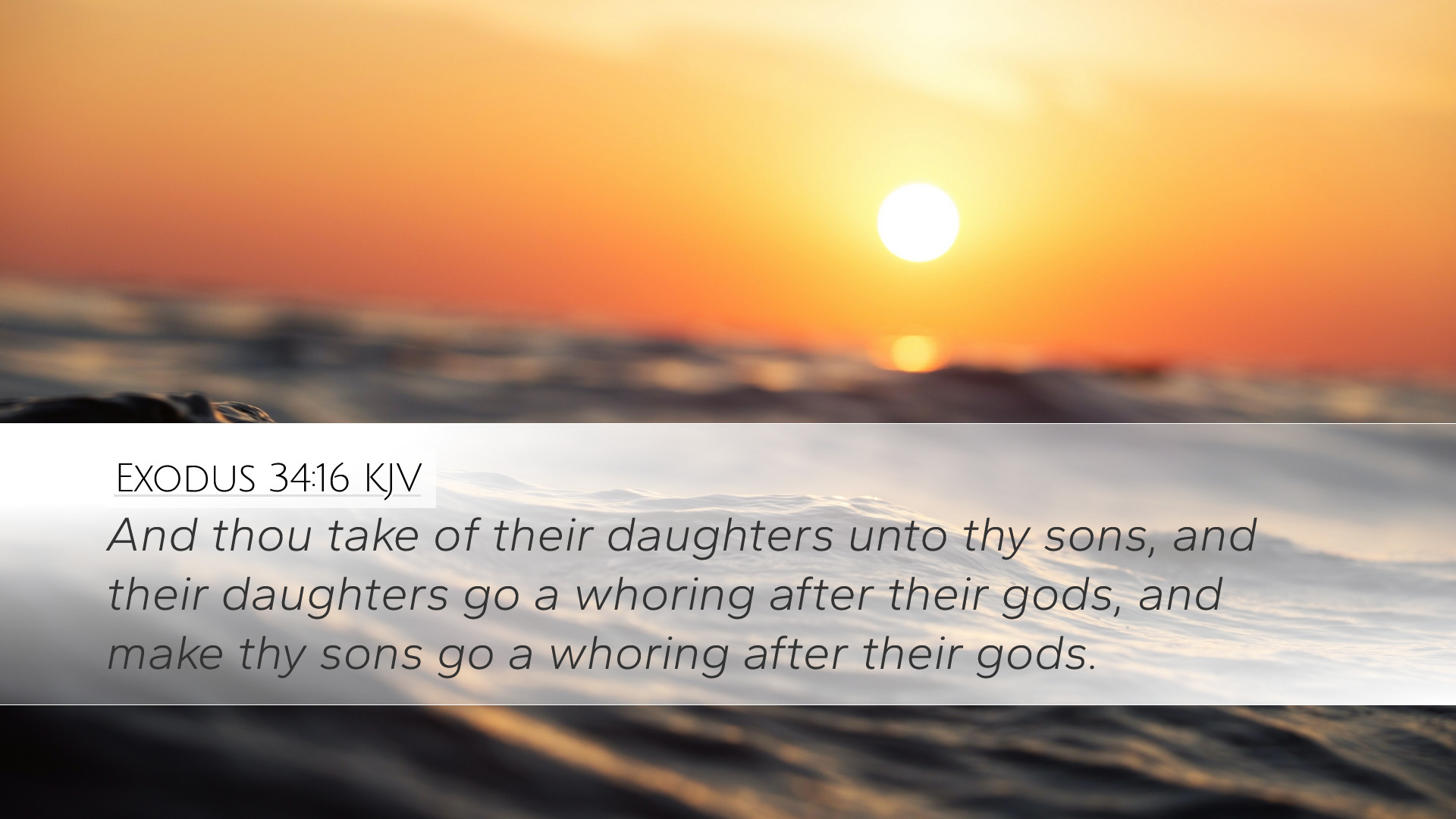Exodus 34:16 - Commentary
Verse: "And you take of their daughters unto your sons, and their daughters go a whoring after their gods, and make thy sons go a whoring after their gods."
Introduction
This verse cautions the people of Israel against intermarriage with the surrounding nations. It highlights the potential spiritual repercussions that can arise when God’s people unite with those who do not share their covenant relationship with Him. Here we will explore insights from Matthew Henry, Albert Barnes, and Adam Clarke to uncover the theological and practical implications of this warning.
Contextual Background
Exodus 34 embodies God’s renewal of the covenant with Israel after the incident of the golden calf. It emphasizes both the holiness of God and the standards He requires of His people. This warning against intermarriage aligns with God's broader command to remain separate from idolatrous practices (Deuteronomy 7:3-4).
Key Insights
-
Matthew Henry:
Henry emphasizes that the intermarriage described was not merely a social or cultural issue, but a profound spiritual danger. He states that marrying foreign women who worship other gods can lead Israel’s men away from their devotion to Yahweh.
Henry warns that “the corruption of manners often follows the wickedness of worship.” He underscored that the hearts of the people could be easily led astray, highlighting the need for vigilance in maintaining purity in worship.
-
Albert Barnes:
Barnes interprets this verse in light of its broader context regarding the covenantal relationship between God and Israel. He argues that the prohibition against intermarriage is rooted in the danger of abandoning the worship of Yahweh. The phrase “go a whoring after their gods” is indicative of spiritual infidelity and betrayal.
Barnes further points out that this warning is not just for ancient Israel but retains relevance for Christians today regarding maintaining spiritual integrity. He highlights that there is a grave risk in forming alliances that dilute one's commitment to God.
-
Adam Clarke:
Clarke offers a detailed examination of the implications of intermarriage with idolaters. He emphasizes that the Israelites' children resulting from such unions would be at risk of following the pagan practices of their mothers. Clarke elucidates that the bond of marriage is powerful and can influence one's faith and practice significantly.
He also discusses the historical context, referencing how the Israelites could learn to worship foreign gods through such relationships, which ultimately leads to God’s anger and judgment on the nation.
Theological Implications
The warning in Exodus 34:16 reflects a deep concern for maintaining fidelity to God. The potential for the Israelites to turn from God through ungodly relationships speaks to the pivotal nature of covenant loyalty. A significant theological insight here is the nature of God’s holiness and the seriousness with which He treats idolatry.
Pastoral Applications
For pastors and leaders in the church today, this verse presents several critical applications:
- Teaching on Holiness: The necessity of teaching congregants about remaining set apart from influences that can compromise their faith is paramount. Pastoral preaching can emphasize the importance of pursuing relationships that encourage spiritual growth rather than hinder it.
- Encouraging Wise Relationships: Church leaders should guide their communities to be intentional about the relationships they cultivate. This includes friendships, dating, and marriages.
- Cultivating Spiritual Vigilance: Leaders can encourage a lifestyle of discernment, where believers assess influences in their lives in light of their commitment to Christ.
Conclusion
Exodus 34:16 serves as a sobering reminder of the impact that relationships can have on one’s faith. The combined insights from Matthew Henry, Albert Barnes, and Adam Clarke provide a robust framework for understanding the spiritual dangers of compromising one's covenant with God. In light of this verse, the call is clear: God’s people are to remain vigilant, ensuring that their relationships reflect their commitment to Him, rooted firmly in holiness and fidelity.


